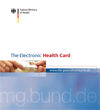 With the introduction of the new card approx. 80 million people with statutory and private health insurance, 21,000 pharmacists, 123,000 registered doctors, 65,000 dentists, 2,200 hospitals as well as the private and statutory health insurance providers will be connected to each other. A project on this scale is unique in Europe and represents an enormous technical and organisational challenge. That is why the Electronic Health Card will not be able to do everything from the outset. It will be gradually expanded with new functions.
With the introduction of the new card approx. 80 million people with statutory and private health insurance, 21,000 pharmacists, 123,000 registered doctors, 65,000 dentists, 2,200 hospitals as well as the private and statutory health insurance providers will be connected to each other. A project on this scale is unique in Europe and represents an enormous technical and organisational challenge. That is why the Electronic Health Card will not be able to do everything from the outset. It will be gradually expanded with new functions. The new Electronic Health Card can do much more: whereas the old Health Insurance Card only had a simple memory chip, the new Electronic Health Card contains a microprocessor chip. This chip is programmable and can execute many different tasks.
For example, prescriptions will no longer be issued on paper in future. They will be made available to you in electronic form with the help of the card.
In addition, you can have personal health data saved using the card. For example, this can be basic medical data for emergency care or documentation of medication taken to inform the doctor or pharmacist treating the patient.
Protection of the data is clearly regulated by means of a comprehensive security concept. An encryption process ensures that information saved about you is always protected against unauthorised access. Furthermore, sensitive health data can be accessed only in conjunction with an electronic Health Professional Card. This is a personal card for doctors, dentists, pharmacists and other personnel with authorised access, for example.
The Electronic Health Card is an important step in the modernisation of health systems; it contains many chances and opportunities. This brochure is designed to give a first overview.
Download:
- "The Electronic Health Card" (.pdf, 294 KB, English version)
- "The Electronic Health Card" (.pdf, 350 KB, German version)
- "The Electronic Health Card" (.pdf, 303 KB, French version)
Published by: Federal Ministry of Health, Public Relations Section, 11055 Berlin, Germany
For further information, please visit:
http://www.die-gesundheitskarte.de